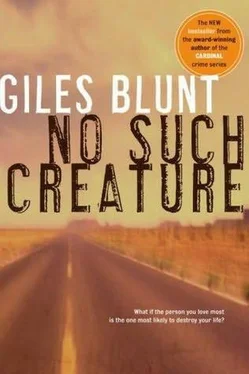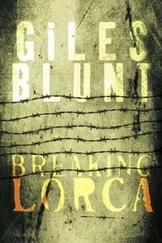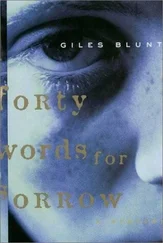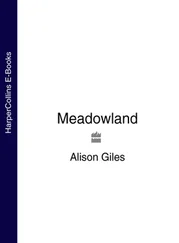Giles Blunt - No Such Creature
Здесь есть возможность читать онлайн «Giles Blunt - No Such Creature» весь текст электронной книги совершенно бесплатно (целиком полную версию без сокращений). В некоторых случаях можно слушать аудио, скачать через торрент в формате fb2 и присутствует краткое содержание. Жанр: Триллер, на английском языке. Описание произведения, (предисловие) а так же отзывы посетителей доступны на портале библиотеки ЛибКат.
- Название:No Such Creature
- Автор:
- Жанр:
- Год:неизвестен
- ISBN:нет данных
- Рейтинг книги:5 / 5. Голосов: 1
-
Избранное:Добавить в избранное
- Отзывы:
-
Ваша оценка:
- 100
- 1
- 2
- 3
- 4
- 5
No Such Creature: краткое содержание, описание и аннотация
Предлагаем к чтению аннотацию, описание, краткое содержание или предисловие (зависит от того, что написал сам автор книги «No Such Creature»). Если вы не нашли необходимую информацию о книге — напишите в комментариях, мы постараемся отыскать её.
No Such Creature — читать онлайн бесплатно полную книгу (весь текст) целиком
Ниже представлен текст книги, разбитый по страницам. Система сохранения места последней прочитанной страницы, позволяет с удобством читать онлайн бесплатно книгу «No Such Creature», без необходимости каждый раз заново искать на чём Вы остановились. Поставьте закладку, и сможете в любой момент перейти на страницу, на которой закончили чтение.
Интервал:
Закладка:
“Watch this,” Buzz said one night, and with a solemn expression he released a viscous blob of saliva from between pursed lips. It elongated, drooped toward the transfixed Owen, and was then reeled back up by a sudden intake of Buzz’s breath. “The trick,” Buzz explained, “is to see how low I can get it to go without actually hitting you.”
“Kind of a one-sided game,” Owen pointed out. “What am I supposed to do-spit upward and see if it’ll reach you?”
“No, doofus. You’re supposed to not move a muscle, no matter how close it gets. It’s a test of nerve.”
“I don’t want to play.”
“Too bad, ‘cause here it comes.” Another hideous blob drooped toward him.
“If that hits me,” Owen said, “I will kill you.”
Buzz made an insincere attempt to recall his missile and it hit Owen squarely in the forehead. His reaction was instantaneous. He booted the springs above him with all his strength, causing Buzz to carom off the ceiling and plummet to the floor. The noise was stupendous, and brought Mr. and Mrs. Platt clattering into the room. Accusations were hurled, evidence weighed, and a rapid judgment reached: the boys would alternate bunks every other day until they learned civility. The experience left Owen with a lifelong aversion to bottom bunks.
Terror and loss were with him day and night, and yet Owen behaved with the utmost calm and politeness to his social worker and foster parents. But every night, when Buzz was asleep, he wept, clutching his pillow to his face in a hot, soggy mass.
After a few days in the land of Buzz, Owen was taken to visit a prospective foster home. Melanie Prine, his social worker from the Department of Children and Families, drove him for miles and miles outside of Norwalk, so that he really had no idea where he was. She was pretty, and yet he couldn’t bear to look at her. To him she consisted entirely of the ten red fingernails that gripped the steering wheel and the chirpy voice telling him about the Tunkles, his prospective foster parents, but his heart was too thick with grief to take anything in. Owen, strapped into the passenger seat as the ever-bleaker countryside rolled by, felt a heavy numbness travelling upward from his ankles until it encased his whole body.
The Tunkles were waiting on the front porch. Melanie Prine gave them a cheery wave as they drove up, five scarlet fingernails flashing in the sun. They were nice enough, and their house was a nice-enough house. Owen could see that it was a comfortable place, a house where people could live with each other, but it was not his house. He did not live here. He did not know anyone here.
The family had an older daughter of sixteen, a blonde girl who said hi and then vanished, and a still older son who was away at college. Melanie Prine abandoned Owen there for the afternoon, leaving the Tunkles to try to interest him in farm life. He was shown to his room, a nice-enough room to be sure, but not his. Just as the bathroom was not his bathroom, the kitchen not his kitchen, the basement not his basement, the front yard with its single stunted maple not his yard. It was as if everyone was playing a game: Let’s pretend this is normal. Let’s pretend we know each other. Let’s pretend we care.
With each minute that ticked by, Owen was exiled deeper into an inner Siberia. The worst moments were when Mr. Tunkle, a bony little man whose skin looked parched and stiff as if he’d been salted and left to dry in the sun, took him by the hand (a hand rough as a plank) to show him the pigs, the chickens, the fields, the cows. Owen had never seen anything so dreary.
Norwalk is not a big city, but it is not a small town and it is most definitely not the country. To Owen, farms were something you drove by to get somewhere interesting-a river, an aquarium, a museum, a campground, an airport. You didn’t stop at farms. The sunlight beat down on the place in a way he had never experienced in shady Norwalk. The chickens were repulsive, the cows somnolent, the pigs appalling. Owen was not afraid of manual labour; he had enjoyed helping his father fix things around the house, and he earned pocket money shovelling snow and raking leaves. But the idea that he would be expected to spend time with these creatures made his heart shrivel.
He would be required to change schools, the nearest neighbour was a mile away, and he would probably never see his friends again.
“Well, what did you think of the Tunkles?” Melanie Prine asked when they were on the way back to the receiving home. Her fingernails had dimmed to carmine in the late afternoon light.
Owen couldn’t answer.
“They’re nice, don’t you think?”
“They’re okay.”
“And isn’t that farmhouse incredible?”
“I don’t want to live there.”
“So much to do out here, don’t you think?”
“I don’t want to live there.”
“Open space everywhere. Lots of fresh air. Did you see they’ve even got a swimming hole?”
“I don’t want to live there.”
Five of the ten red fingernails lifted off from the steering wheel and travelled toward him as Miss Prine tried to comfort him with a touch on his shoulder. It was the briefest feathery touch, but it burst something inside Owen’s chest and he convulsed with tears.
“No one expects you to like it right away, Owen.”
“I don’t want to live there,” he said again, all but choking on each word.
“You’re not used to the country, I know. But a farm is an ideal place to grow up. So much to do. And it’s fun looking after the animals, don’t you think?”
“I want to live in my own home,” he said miserably. “Why can’t I just stay at home?”
“Owen, your parents aren’t there anymore. There’s no one to look after you.”
“But you said there’s money, right? Insurance money? Why can’t we pay a babysitter and I’ll just stay in my house? I don’t have to have new parents. I don’t want new parents. Would you want new parents?”
“No, Owen, I wouldn’t. Nobody wants to lose their parents. You’ve been very unlucky. But we have to find you another family to live with, and the Tunkles are good parents and they have room.”
“But I don’t want to live there.”
Owen was sent to the Tunkles the following day. He spent a painful weekend supposedly adapting to the routines of the farm, and when Monday rolled around he took the bus to his new school and sat silently throughout his classes. He made no effort to acknowledge his new classmates, and when his teacher called on him, he had nothing to say, he had heard nothing. He was focused strictly on the final bell, waiting hour after hour, minute after minute, for it to ring. When finally it did ring, he went nowhere near the bus stop. He walked into town and back to his old neighbourhood.
He had never seen his house with all the curtains closed. It sat blind and mute on the corner where it had always been. No car in the drive, of course, but then there never was when he got home from school. He still had his key, and let himself in.
It was a little stuffy, a little dusty, but it smelled the same. It smelled of his house, the way no other house would ever smell. And nothing had changed. All the furniture was there. The coats were still hanging in the vestibule-his mother’s, his father’s, his own-above a chaotic jumble of footwear. The merest objects filled him not just with pain, but with awe: his father’s enormous running shoes, the wellingtons his mother wore in the garden. He went and sat on the couch in the living room, facing the television. His reflection on the dim screen, thin and distorted, looked back at him.
He had never seen the house so dark, not during the day. He fell sideways into the cushions and cried, but it didn’t help. After a while he went to the kitchen and pulled a bottle of Snapple from the fridge. All the same food was there. Nothing had been done yet, by whoever had come in to close the curtains. The electricity was on, and the water.
Читать дальшеИнтервал:
Закладка:
Похожие книги на «No Such Creature»
Представляем Вашему вниманию похожие книги на «No Such Creature» списком для выбора. Мы отобрали схожую по названию и смыслу литературу в надежде предоставить читателям больше вариантов отыскать новые, интересные, ещё непрочитанные произведения.
Обсуждение, отзывы о книге «No Such Creature» и просто собственные мнения читателей. Оставьте ваши комментарии, напишите, что Вы думаете о произведении, его смысле или главных героях. Укажите что конкретно понравилось, а что нет, и почему Вы так считаете.












